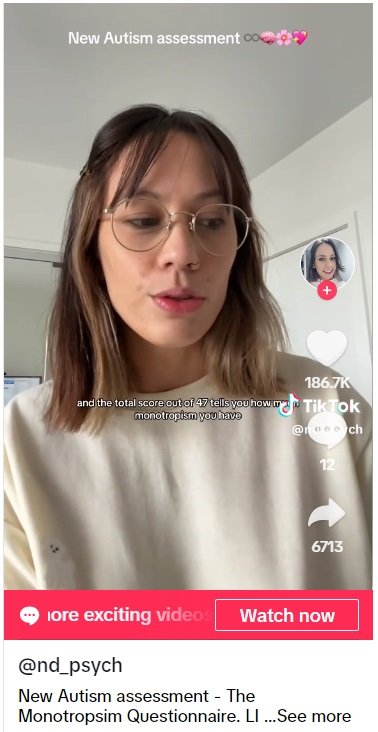NOT a new autism assessment: the Monotropism Questionnaire
There’s been some considerable excitement recently, particularly on TikTok, about a “new Autism assessment” called the Monotropism Questionnaire.
I watched a few of the videos talking about the Monotropism Questionnaire, like this one from @nd_psych, and my spidey-sense was all of a tingle, so I thought I’d have a proper look into it.
What is Monotropism
Well, it is a theory about autism, particularly in relation to thinking styles. It proposes that autistic minds may tend to focus on a few interests and concerns rather than on a wide range of things.
The researchers who developed the questionnaire suggest the theory of monotropism may be useful for explaining the experience of “hyperfocus”, which both ADHD and autistic people often report. In fact, proponents of monotropism theory suggest that it might be the reason for the overlap between ADHD and ASD, which as yet hasn’t been successfully explained.
“An estimated 30 to 80 percent of children with autism also meet the criteria for ADHD and, conversely, 20 to 50 percent of children with ADHD for autism.”
The creators of the Monotropism Questionnaire decided to test whether monotropism theory really does describe the autistic experience and the results can be found in their paper Development and Validation of a Novel Self-Report Measure of Monotropism in Autistic and Non-Autistic People: The Monotropism Questionnaire (2). The paper itself is currently available as a pre-print publication, which means it has yet to be peer reviewed. It’s been made available so that other academics are aware of its existence but hasn’t been given enough of a thumbs up by the academic community to be published formally.
The questionnaire
The Monotropism Questionnaire may have been described as a new autism assessment on TikTok, but the researchers have been very clear that this is not the case. Co-author Fergus Murray posted on TikTok to say the questionnaire is a tool to understand the autistic experience of monotropism, and not an autism assessment tool.
The fact that a questionnaire from an unpublished paper has been picked up by the neurodivergent community demonstrates the huge desire and need for understanding and support felt by that community. It’s understandable that any tool that can help neurodivergent people understand themselves in relation to others, to validate their feelings of difference and to help them gain more insight into what is going on for them, is going to be of great interest. However, people can, and do, run into problems when using self-diagnosis tools, particularly non-academic tools or tools which haven’t been fully tested.
The problem with self-assessment tools
So you are beginning to think that you may be autistic. Where do you go?
Many people turn to the internet for answers. And there are many answers to be found there, from the Star Wars character you are most like, to your “preferred” personality type (I won’t get started on Myers Briggs – that’s for a different day). But how trustworthy are the questionnaires that claim to tell you if you are autistic, or not? What dangers are lurking in the self-assessment pool?
At best, self-assessment tools available online, such as the AQ (Autistic Spectrum Quotient) RAADS-R (Ritvo Autism Asperger Diagnostic Scale Revised) or CAT-Q (a test designed to measure social camouflaging of autistic traits) can give you an idea of whether you are, or aren’t, autistic, which may encourage some to explore further.
At worst, they can give people false information and false hope.
All of these assessments have their downsides, often in the way the questions are formed, the audience they were designed for or tested with (commonly white, middle class boys), but perhaps the greatest problem with them is that they can only give an indication of the likelihood of a person being autistic. They often don’t consider socio-cultural context, or other important factors, such as a history of trauma, or other neurodivergences such as ADHD.
The way to gain a definitive view of the likelihood of autism is through an assessment with a person qualified to make that diagnosis. However, we understand that not everyone is able to access that, especially with increasing restrictions in the NHS on who can access diagnostic assessment in some areas.
Clinical autism assessment tools
There are a few assessment tools that are formally used to assess autism, the most common being the DISCO (Diagnostic Interview for Social and Communication Disorders), the ADI-R (Autism Diagnostic Interview - Revised), the ADOS (Autism Diagnostic Observation Schedule) and 3Di (Developmental, Dimensional and Diagnostic Interview). These assess you against a set of criteria for autism, found in diagnostic manuals ICD-10 and The DSM-5.
Benefits of diagnosis
A formal diagnosis can have many benefits, not least that it can unlock support opportunities like Access to Work funds and workplace adaptations. Although such support is theoretically available without a diagnosis, not having one can be a barrier to people feeling able to apply and self advocate, resulting in their differences not being recognised and applications turned down.
Diagnosis can also provide a sense of validity and relief, releasing people from self-blame and starting them on a path to fully realising who they are. Self-assessments and screening processes may give some people enough insight so that they self-identify with autism, or ADHD, and are quite happy with that. Others may need more - more validation and importantly, more support. Which brings me to the distressing tale of the Do-IT Profiler.
Access Denied – the Do-IT profiler
A screening and assessment tool is being used as a replacement for formal autism and ADHD assessments in Humber and North Yorkshire Health and Care Partnership. Formal assessments are only being provided to those with specific, life-threatening conditions or circumstances.
The York Disability Rights Forum have set up a crowd justice case, as they are concerned that these exclusions are likely to have a negative impact on mental health in a population already vulnerable to self-harm and suicide. They also note that:
“The criteria also prevent GPs from referring people through Right to Choose pathways for assessments of ADHD and autism – despite the legal right to assessment with a suitably experienced and qualified professional, as set out in the NHS constitution.”
You can donate or connect with the group here.
Supporting someone who needs a formal diagnosis
If you’re a counsellor, therapist, or mental health professional and you want to know more about how you can help people through the formal assessment process for ADHD or autism, then Free2bMe’s workshops on Supporting clients to access assessments might be of interest. You can sign up to our mailing list for news on when the next workshops are running, or check our Eventbrite page.
Refs
1 Ricki Rusting, 2018, Spectrum news. Go to article
2 Garau, V., Woods, R., Chown, N., Hallett, S., Murray, F., Wood, R., Murray, A. & Fletcher-Watson, S. (2023). The Monotropism Questionnaire, Open Science Framework. Go to article
Posted 31 July 2023



